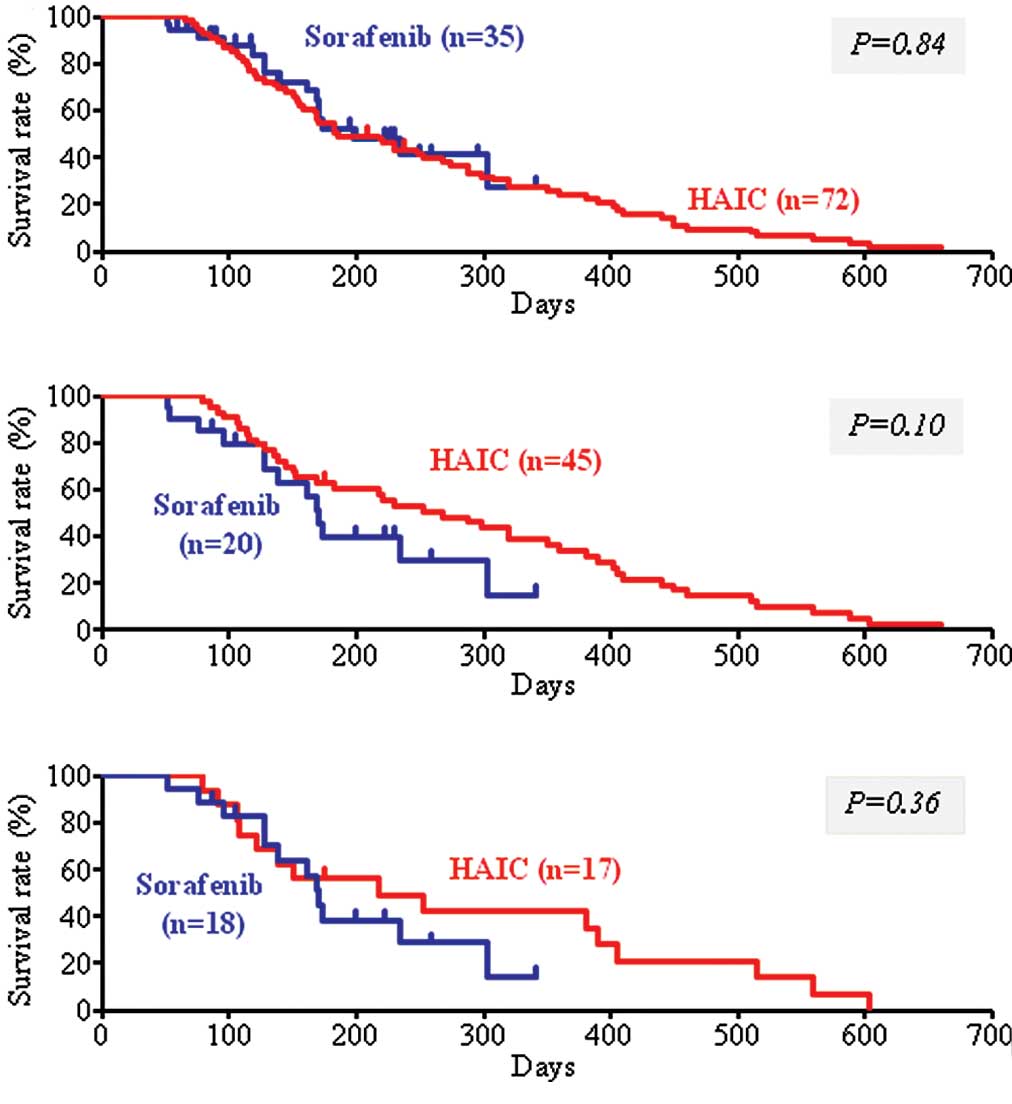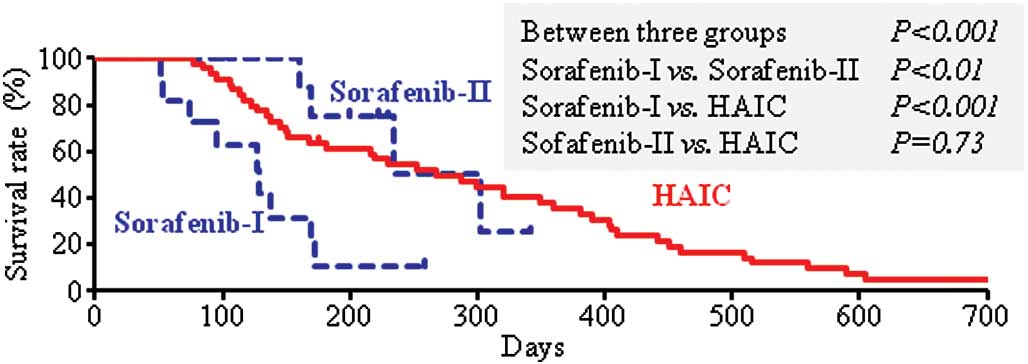|
1.
|
Cabibbo G, Latteri F, Antonucci M and
Craxì A: Multimodal approaches to the treatment of hepatocellular
carcinoma. Nat Clin Pract Gastroenterol Hepatol. 6:159–169. 2009.
View Article : Google Scholar : PubMed/NCBI
|
|
2.
|
Kim BK, Park JY, Choi HJ, Kim DY, Ahn SH,
Kim JK, Lee DY, Lee KH and Han KH: Long-term clinical outcomes of
hepatic arterial infusion chemotherapy with cisplatin with or
without 5-fluorouracil in locally advanced hepatocellular
carcinoma. J Cancer Res Clin Oncol. June 16–2010.(Epub ahead of
print).
|
|
3.
|
Ikeda M, Maeda S, Ashihara H, Nagahama H,
Tanaka M and Sasaki Y: Transcatheter arterial infusion chemotherapy
with cisplatin-lipiodol suspension in patients with hepatocellular
carcinoma. J Gastroenterol. 45:60–67. 2010. View Article : Google Scholar
|
|
4.
|
Llovet JM, Ricci S, Mazzaferro V, Hilgard
P, Gane E, Blanc JF, de Oliveira AC, Santoro A, Raoul JL, Forner A,
Schwartz M, Porta C, Zeuzem S, Bolondi L, Greten TF, Galle PR,
Seitz JF, Borbath I, Häussinger D, Giannaris T, Shan M, Moscovici
M, Voliotis D and Bruix J: SHARP investigators study group:
sorafenib in advanced hepatocellular carcinoma. N Engl J Med.
359:378–390. 2008. View Article : Google Scholar : PubMed/NCBI
|
|
5.
|
Cheng AL, Kang YK, Chen Z, Tsao CJ, Qin S,
Kim JS, Luo R, Feng J, Ye S, Yang TS, Xu J, Sun Y, Liang H, Liu J,
Wang J, Tak WY, Pan H, Burock K, Zou J, Voliotis D and Guan Z:
Efficacy and safety of sorafenib in patients in Asia-Pacific region
with advanced hepatocellular carcinoma: a phase III randomized,
double-blind, placebo-controlled trial. Lancet Oncol. 10:25–34.
2009. View Article : Google Scholar
|
|
6.
|
Llovet JM, Di Bisceglie AM, Bruix J,
Kramer BS, Lencioni R, Zhu AX, Sherman M, Schwartz M, Lotze M,
Talwalkar J and Gores GJ: Panel of experts in HCC-design clinical
trials: design and endpoints of clinical trials in hepatocellular
carcinoma. J Natl Cancer Inst. 100:698–711. 2008. View Article : Google Scholar
|
|
7.
|
Kudo M: The 2008 Okuda lecture: management
of hepatocellular carcinoma: from surveillance to
molecular-targeted therapy. J Gastroenterol Hepatol. 25:439–452.
2010. View Article : Google Scholar : PubMed/NCBI
|
|
8.
|
Cabrera R and Nelson DR: The management of
hepatocellular carcinoma. Aliment Pharmacol Ther. 31:461–476. 2010.
View Article : Google Scholar : PubMed/NCBI
|
|
9.
|
Urabe T, Kaneko S, Matsushita E, Unoura M
and Kobayashi K: Clinical pilot study of intrahepatic arterial
chemotherapy with methotrexate, 5-fluorouracil, cisplatin and
subcutaneous interferon-alpha-2b for patients with locally advanced
hepatocellular carcinoma. Oncology. 55:39–47. 1998. View Article : Google Scholar
|
|
10.
|
Kuroda M, Kobayashi Y, Urawa N, Yamamoto
M, Mifuji R, Araki J, Tanaka H, Horiike S, Itani T, Furjita N,
Konishi M, Iwasa M, Kaito M and Adachi Y: Hepatic arterial infusion
of 5-fluorouracil in combination with subcutaneous interferon-alpha
for advanced hepatocellular carcinoma. Hepatogastroenterology.
54:518–521. 2007.
|
|
11.
|
Uka K, Aikata H, Takaki S, Miki D, Kawaoka
T, Jeong SC, Takahashi S, Toyota N, Ito K and Chayama K:
Pretreatment predictor of response, time to progression, and
survival to intraarterial 5-fluorouracil/interferon combination
therapy in patients with advanced hepatocellular carcinoma. J
Gastroenterol. 42:845–853. 2007. View Article : Google Scholar
|
|
12.
|
Ando E, Tanaka M, Yamashita F, Kuromatsu
R, Yutani S, Fukumori K, Sumie S, Yano Y, Okuda K and Sata M:
Hepatic arterial infusion chemotherapy for advanced hepatocellular
carcinoma with portal vein tumor thrombosis: analysis of 48 cases.
Cancer. 95:588–595. 2002. View Article : Google Scholar
|
|
13.
|
Tanioka H, Tsuji A, Morita S, Horimi T,
Takamatsu M, Shirasaka T, Mizushima T, Ochi K, Kiura K and Tanimoto
M: Combination chemotherapy with continuous 5-fluorouracil and
low-dose cisplatin infusion for advanced hepatocellular carcinoma.
Anticancer Res. 23:1891–1897. 2003.PubMed/NCBI
|
|
14.
|
Yoshikawa M, Ono N, Yodono H, Ichida T and
Nakamura H: Phase II study of hepatic arterial infusion of a
fine-powder formulation of cisplatin for advanced hepatocellular
carcinoma. Hepatol Res. 38:474–483. 2008. View Article : Google Scholar
|
|
15.
|
Kondo M, Nagano H, Sakon M, Yamamoto H,
Morimoto O, Arai I, Miyamoto A, Eguchi H, Dono K, Nakamori S,
Umeshita K, Wakasa K, Ohmoto Y and Monden M: Expression of
interferon alpha/beta receptor in human hepatocellular carcinoma.
Int J Oncol. 17:83–88. 2000.PubMed/NCBI
|
|
16.
|
Ota H, Nagano H, Sakon M, Eguchi H, Kondo
M, Yamamoto T, Nakamura M, Damdinsuren B, Wada H, Marubashi S,
Miyamoto A, Dono K, Umeshita K, Nakamori S, Wakasa K and Monden M:
Treatment of hepatocellular carcinoma with major portal vein
thrombosis by combined therapy with subcutaneous interferon-alpha
and intra-arterial 5-fluorouracil; role of type 1 interferon
receptor expression. Br J Cancer. 93:557–564. 2005. View Article : Google Scholar
|
|
17.
|
Kudo M: Current status of molecularly
targeted therapy for hepatocellular carcinoma: clinical practice.
Int J Clin Oncol. 15:242–255. 2010. View Article : Google Scholar : PubMed/NCBI
|
|
18.
|
Shen YC, Hsu C and Cheng AL: Molecular
targeted therapy for advanced hepatocellular carcinoma: current
status and future perspectives. J Gastroenterol. 45:794–807. 2010.
View Article : Google Scholar : PubMed/NCBI
|
|
19.
|
Park JY, Ahn SH, Yoon YJ, Kim JK, Lee HW,
Lee do Y, Chon CY, Moon YM and Han KH: Repetitive short-course
hepatic arterial infusion chemotherapy with high-dose
5-fluorouracil and cisplatin in patients with advanced
hepatocellular carcinoma. Cancer. 110:129–137. 2007. View Article : Google Scholar
|
|
20.
|
Furuse J, Ishii H, Nakachi K, Suzuki E,
Shimizu S and Nakajima K: Phase I study of sorafenib in Japanese
patients with hepatocellular carcinoma. Cancer Sci. 99:159–165.
2008.PubMed/NCBI
|
|
21.
|
Ando E, Yamashita F, Tanaka M and Tanikawa
K: A novel chemotherapy for advanced hepatocellular carcinoma with
tumor thrombosis of the main trunk of the portal vein. Cancer.
79:1890–1896. 1997. View Article : Google Scholar : PubMed/NCBI
|
|
22.
|
Therasse P, Arbuck SG, Eisenhauer EA,
Wanders J, Kaplan RS, Rubinstein L, Verweij J, van Glabbeke M, van
Oosterom AT, Christian MC and Gwyther SG: New guidelines to
evaluate the response to treatment in solid tumors. European
Organization for Research and Rreatment of Cancer, national Cancer
Institute of the United States, national Cancer Institute of
Canada. J Natl Cancer Inst. 92:205–216. 2000. View Article : Google Scholar
|
|
23.
|
Japanese translation of common terminology
criteria for adverse events (CTCAE), and instructions and
guidelines. Int J Clin Oncol. 9(Suppl. 3): S1–S82. 2004.(In
Japanese).
|
|
24.
|
Rouillier P, Senesse P, Cottet V, Valléau
A, Faivre J and Boutron-Ruault MC: Dietary patterns and the
adenomacarcinoma sequence of colorectal cancer. Eur J Nutr.
44:311–318. 2005. View Article : Google Scholar : PubMed/NCBI
|
|
25.
|
Furuse J: Sorafenib for the treatment of
unresectable hepatocellular-carcinoma. Biologics. 2:779–788.
2008.PubMed/NCBI
|
|
26.
|
Abou-Alfa GK, Schwartz L, Ricci S, Amadori
D, Santoro A, Figer A, de Greve J, Douillard JY, Lathia C, Schwartz
B, Taylor I, Moscovici M and Saltz LB: Phase II study of sorafenib
in patients with advanced hepatocellular carcinoma. J Clin Oncol.
24:4293–4300. 2006. View Article : Google Scholar
|
|
27.
|
Yang CH, Lin WC, Chuang CK, Chang YC, Pang
ST, Lin YC, Kuo TT, Hsieh JJ and Chang JW: Hand-foot skin reaction
in patients treated with sorafenib: a clinicopathological study of
cutaneous manifestations due to multitargeted kinase inhibitor
therapy. Br J Dermatol. 158:592–596. 2008. View Article : Google Scholar
|
|
28.
|
Hakamada K, Kimura N, Miura T, Morohashi
H, Ishido K, Nara M, Toyoki Y, Narumi S and Sasaki M:
Des-gamma-carboxy prothrombin as an important prognostic indicator
in patients with small hepatocellular carcinoma. World J
Gastroenterol. 14:1370–1377. 2008. View Article : Google Scholar
|
|
29.
|
Bruix J and Llovet JM: Prognostic
prediction and treatment strategy in hepatocellular carcinoma.
Hepatology. 35:519–524. 2002. View Article : Google Scholar : PubMed/NCBI
|
|
30.
|
Woo HY, Bae SH, Park JY, Han KH, Chun HJ,
Choi BG, Im HU, Choi JY, Yoon SK, Cheong JY, Cho SW, Jang BK, Hwang
JS, Kim SG, Kim YS, Seo YS, Yim HJ and Um SH: A randomized
comparative study of high-dose and low-dose hepatic arterial
infusion chemotherapy for intractable, advanced hepatocellular
carcinoma. Cancer Chemother Pharmacol. 65:373–382. 2010. View Article : Google Scholar
|
|
31.
|
Kudo M and Ueshima K: Positioning of a
molecular-targeted agent, sorafenib, in the treatment algorithm for
hepatocellular carcinoma and implication of many complete remission
cases in Japan. Oncology. 78(Suppl. 1): S154–S166. 2010. View Article : Google Scholar
|
|
32.
|
Abou-Alfa GK, Johnson P, Knox JJ, Capanu
M, Davidenko I, Lacava J, Leung T, Gansukh B and Saltz LB:
Doxorubicin plus sorafenib vs. doxorubicin alone in patients with
advanced hepatocellular carcinoma: a randomized trial. JAMA.
304:2154–2160. 2010. View Article : Google Scholar : PubMed/NCBI
|
|
33.
|
Vincenzi B, Santini D, Russo A, Addeo R,
Giuliani F, Montella L, Rizzo S, Venditti O, Frezza AM, Caraglia M,
Colucci G, del Prete S and Tonini G: Early skin toxicity as a
predictive factor for tumor control in hepatocellular carcinoma
patients treated with sorafenib. Oncologis. 15:85–92. 2010.
View Article : Google Scholar
|
|
34.
|
La Vine DB, Coleman TA, Davis CH,
Carbonell CE and Davis WB: Frequent dose interruptions are required
for patients receiving oral kinase inhibitor therapy for advanced
renal cell carcinoma. Am J Clin Oncol. 33:217–220. 2010.PubMed/NCBI
|
|
35.
|
Tanaka Y, Nishida N, Sugiyama M, Tokunaga
K and Mizokami M: Lambda-interferons and the single nucleotide
polymorphisms: a milestone to tailor-made therapy for chronic
hepatitis C. Hepatol Res. 40:449–460. 2010. View Article : Google Scholar
|
|
36.
|
Okanoue T, Itoh Y, Hashimoto H, Yasui K,
Minami M, Takehara T, Tanaka E, Onji M, Toyota J, Chayama K,
Yoshioka K, Izumi N, Akuta N and Kumada H: Predictive values of
amino acid sequences of the core and nS5A regions in antiviral
therapy for hepatitis C: a Japanese multi-center study. J
Gastroenterol. 44:952–963. 2009. View Article : Google Scholar
|
|
37.
|
Villanueva A, Minguez B, Forner A, Reig M
and Llovet JM: Hepatocellular carcinoma: novel molecular approaches
for diagnosis, prognosis, and therapy. Annu Rev Med. 61:317–328.
2010. View Article : Google Scholar : PubMed/NCBI
|
















